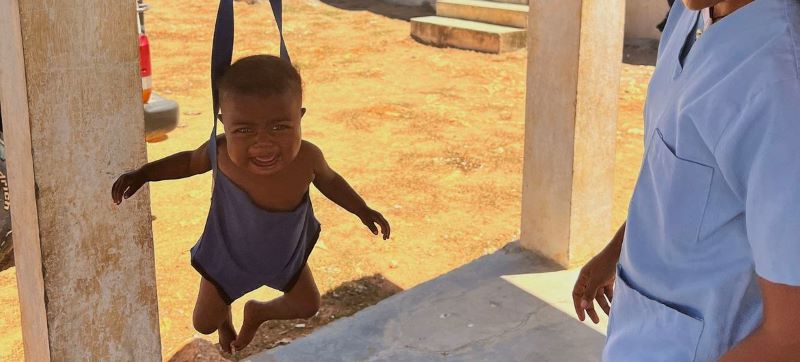 COVID19
COVID19
WHO data shows COVID-19 eliminated a decade of progress in global level of life expectancy
Data crunched by the UN World Health Organization (WHO) has revealed that the COVID-19 emergency reversed more than a decade of gains in life expectancy, reinforcing the need for countries to agree on a global pandemic treaty to protect future generations.
According to the UN agency, between 2019 and 2021 – the early years of the global health emergency - life expectancy around the world dropped by 1.8 years to 71.4 years, which is the 2012 level.
Responding to the findings, WHO Director-General Tedros Adhanom Ghebreyesus highlighted the fragility of global health advances when confronted with unprecedented emergencies like the pandemic, which caused more than seven million confirmed deaths.
“In just two years, the COVID-19 pandemic erased a decade of gains in life expectancy,” Tedros said. “That's why the new Pandemic Agreement is so important: not only to strengthen global health security, but to protect long-term investments in health and promote equity within and between countries.”
Regional differences
Regionally, the Americas and South-East Asia felt the biggest impact of the coronavirus, with life expectancy dropping by around three years.
In contrast, Western Pacific countries were minimally affected during the first two years of the pandemic, with only small losses in life expectancy and healthy life expectancy.
The WHO’s World Health Statistics 2024 report confirmed that COVID-19 was the third highest cause of death globally in 2020 and the second highest a year later.
The coronavirus was also the leading cause of mortality in the Americas for 2020 and 2021.
Noncommunicable diseases
Before the pandemic, noncommunicable diseases remained the top killer, the UN health agency said, accounting for 74 per cent of all deaths in 2019.
During the pandemic, chronic conditions such as heart disease and stroke, cancer and dementia were behind 78 per cent of non-COVID deaths.
Malnutrition in children ‘striking’
Other major causes of lives being cut short are malnutrition, undernutrition, overweight and obesity. In 2022, over one billion people aged five years and older lived with obesity, while more than half a billion were underweight.
“Malnutrition in children was also striking,” the WHO report said, “with 148 million children under five years old affected by stunting - too short for age - 45 million suffering from wasting - too thin for height - and 37 million overweight.”
Healthcare inequity
The WHO’s World Health Statistics report also highlighted the challenges faced by people with disabilities, refugees and migrants.
In 2021, about 1.3 billion people, or 16 per cent of the global population, had a disability. “This group is disproportionately affected by health inequities resulting from avoidable, unjust and unfair conditions,” the UN health agency insisted.
Similar medical aid access problems exist for refugees and migrants, the WHO noted, after finding that only half of the dozens of countries surveyed between 2018 and 2021 provided publicly funded healthcare to them at the same level as other citizens. “This highlights the urgent need for health systems to adapt and address the persisting inequities and changing demographic needs of global populations,” WHO said.
Despite the multiple setbacks to public health caused by COVID-19, the UN health agency insisted that progress has been made towards achieving better health for all, in line with the Sustainable Development Goals (SDGs). These include the fact that since 2018, an additional 1.5 billion people achieved better health and wellbeing globally, and 585 million more people today have access to universal health coverage.
Pandemic treaty talks
In a bid to head off a future pandemic, the WHO is leading highly complex discussions with UN Member States to draft and negotiate a convention to agree on the collective steps that will be needed from governments around the world.
The aim is to present the outcome of these negotiations at the next World Health Assembly meeting in Geneva next week, where the WHO’s 194 Member States are scheduled to adopt the international accord.
Participation in the agreement by countries would be voluntary – contrary to online disinformation campaigns falsely alleging that the accord would mean surrendering sovereignty - and in the interests of the citizens of those countries and others, offering more effective pandemic preparedness and response.
According to WHO, negotiations on a future agreement revolve around the need to ensure equitable access to the tools needed to prevent pandemics – vaccines, protective equipment, information and expertise – and universal access to healthcare for everyone.
Support Our Journalism
We cannot do without you.. your contribution supports unbiased journalism
IBNS is not driven by any ism- not wokeism, not racism, not skewed secularism, not hyper right-wing or left liberal ideals, nor by any hardline religious beliefs or hyper nationalism. We want to serve you good old objective news, as they are. We do not judge or preach. We let people decide for themselves. We only try to present factual and well-sourced news.







